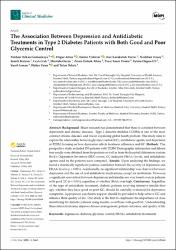| dc.contributor.author | Gümüşkaya, Perihan Özkan | |
| dc.contributor.author | Altun, Özgür | |
| dc.contributor.author | Yıldırım, Emine | |
| dc.contributor.author | Yüztaş, Nur Karakütük | |
| dc.contributor.author | Özsoy, Neslihan | |
| dc.contributor.author | Kalyon, Semih | |
| dc.contributor.author | Irak, Leyla | |
| dc.contributor.author | Özcan, Mustafa | |
| dc.contributor.author | Altun, Zeren Öztürk | |
| dc.contributor.author | Demir, Pınar Saner | |
| dc.contributor.author | Uzun, Hafize | |
| dc.date.accessioned | 2025-10-13T11:52:39Z | |
| dc.date.available | 2025-10-13T11:52:39Z | |
| dc.date.issued | 2025 | en_US |
| dc.identifier.citation | Gumuskaya, P. O., Altun, O., Yildirim, E., Yuztas, N. K., Ozsoy, N., Kalyon, S., … Tukek, T. (2025). The association between depression and antidiabetic treatments in type 2 diabetes patients with both good and poor glycemic control. Journal of Clinical Medicine, 14(10), 3460. https://doi.org/10.3390/jcm14103460 | en_US |
| dc.identifier.issn | 2077-0383 | |
| dc.identifier.uri | https://hdl.handle.net/20.500.12900/722 | |
| dc.description.abstract | Background: Much research has demonstrated that there is a relation between depression and chronic diseases. Type 2 diabetes mellitus (T2DM) is one of the most common chronic diseases, and it is an expanding global health problem. This study aims to explore the relationship between glycemic control (GC), antidiabetic agents, and depression in T2DM, focusing on how depression affects treatment adherence and GC. Methods: This prospective study included 250 patients with T2DM. Demographic information and laboratory results were obtained from the patients as well as from the hospital's laboratory system. Beck's Depression Inventory (BDI) scores, GC indicator HbA1c levels, and antidiabetic agents used by the patients were compared. Results: Upon analyzing the findings, we found a statistically significant positive correlation between the severity of depression and HbA1c levels (p < 0.001). Additionally, no significant relationship was observed between depression and the use of oral antidiabetic medications, except for metformin. However, a significant association between depression and insulin use was found even in patients with good GC (p < 0.001), regardless of whether HbA1c was high. Conclusions: Regardless of the type of antidiabetic treatment, diabetic patients receiving intensive insulin therapy, whether they have good or poor GC, should be carefully evaluated for depressive symptoms. Appropriate psychiatric support should be provided to help achieve GC and enhance their quality of life. Our study is the first to emphasize the importance of close monitoring for diabetic patients using insulin, even those with good GC. Understanding these interactions may improve disease management, patient outcomes, and quality of life. | en_US |
| dc.language.iso | eng | en_US |
| dc.publisher | MDPI | en_US |
| dc.relation.isversionof | 10.3390/jcm14103460 | en_US |
| dc.rights | info:eu-repo/semantics/openAccess | en_US |
| dc.subject | Depression | en_US |
| dc.subject | Diabetes | en_US |
| dc.subject | Glycemic control | en_US |
| dc.subject | HbA1c | en_US |
| dc.subject | Antidiabetic treatments | en_US |
| dc.title | The Association Between Depression and Antidiabetic Treatments in Type 2 Diabetes Patients with Both Good and Poor Glycemic Control | en_US |
| dc.type | article | en_US |
| dc.department | İstanbul Atlas Üniversitesi, Tıp Fakültesi, Cerrahi Tıp Bilimleri Bölümü | en_US |
| dc.contributor.institutionauthor | Uzun, Hafize | |
| dc.contributor.institutionauthor | Yıldırım, Emine | |
| dc.identifier.volume | 14 | en_US |
| dc.identifier.issue | 10 | en_US |
| dc.relation.journal | JOURNAL OF CLINICAL MEDICINE | en_US |
| dc.relation.publicationcategory | Makale - Uluslararası Hakemli Dergi - Kurum Öğretim Elemanı | en_US |

















